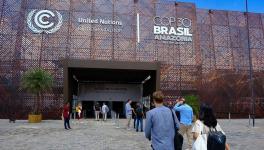Containing Carbon Emissions: Basic Human Needs Versus Economic Growth

Image for representational use only; Image Courtesy : Physics World
Many treaties have been signed to contain the man-made climate change; different aspects of containing climate change have been explored; but humanity still has miles to go in that direction. The Paris Agreement aims at limiting global warming to an incline of 1.5 -2.0 degree Celsius by the year 2030. Latest IPCC report also says that the anthropogenic carbon emissions have to be reduced by 45 per cent by 2030 only to avoid a situation of warming that humanity can’t simply afford to witness.
But the question still lingers—how can we manage to do this? One assessment published recently suggests fundamental changes in the society. It says that there needs to be an utmost necessity of fulfilling human needs like happiness and health instead of focusing on economic growth.
Gibran Vita of Norwegian University of Science and Technology and the lead author of the publication says, “We need to start thinking. Is the carbon footprint that comes from different economic activities actually worth it in terms of societal outcomes?” He adds, “There is potential to live fulfilling lives with much less environmental impact.”
Vita and his team analysed the carbon footprints that result from fulfilling the fundamental needs of people. They took into consideration nine needs: affection, identity, protection, participation, subsistence, understanding, creation, freedom and leisure. They calculated the carbon footprint that is associated with meeting each need by looking at the goods and services that are used to meet it.
The team used EXIOBASE 3, the open access database of information on greenhouse gas emission associated with economic activity of 200 goods in 44 countries. And finally, quality of life was measured to assess the effectiveness of these carbon investments.
Their assessment showed that not all needs are equally polluting. Meeting subsistence and protection needs nearly half the global carbon budget, the other half is taken by leisure, identity, creation and freedom. Importantly, understanding and participation are relatively cheap—responsible for less than 4 per cent of the carbon emissions.
In their comparison of carbon expenditure among different countries, they found that some needs reach the saturation very quickly, whereas there are others that are a bottomless pit.
“No matter how wealthy you are, you can only spend so much money on store-bought food or in heating your house,” explains Vita to Physics World, “But there is virtually no limit to the money you can spend on holidays, entertainment, leisure, restaurants, education, and so on even you are not getting more quality of life bang for your buck.”
Using the indicators of quality of life adopted by the Human Development Report of UN, they investigated how fulfilled people of the countries they considered felt regarding their needs that were met. The team compared the carbon spent by the people on each need.
Their results show that meeting all the physical needs of a person—affordable housing, good health, clean water and so on required 1 to 3 tonnes of carbon per person per year. Countries like the USA and Australia emit 6 to 8 tonnes of carbon per person per year to meet the same needs that lower income countries emit – 1 tonne carbon per person per year.
Electricity access, child survival and objective measures as such have a critical value, beyond which more consumptions don’t bring more happiness and satisfactions. Vita and his colleagues believe that these areas can bring hope where carbon emissions can be lowered without compromising people’s health and well-being.
They argue, “The challenge is to build societies where our activities are more holistic, enabling us to balance achievement, relaxation, work, play, romance, responsibility and freedom, without each of these pursuits being mutually exclusive”.
In this regard, countries like Denmark can be exemplary. People in Denmark have the carbon footprint in meeting their leisure needs that is two thirds of the people of Czech Republic.
“Denmark has people-centred city design, people-centred public spaces, subsidies for sport, good food, accessible cultural events, shorter working days and decent holidays and none of this requires more carbon. Similarly, countries including Bhutan and some Latin American nations focus on ‘living well’, where helping people to flourish is the driving concern, rather than economic growth,” Vita stated in Physics World.
Get the latest reports & analysis with people's perspective on Protests, movements & deep analytical videos, discussions of the current affairs in your Telegram app. Subscribe to NewsClick's Telegram channel & get Real-Time updates on stories, as they get published on our website.
























